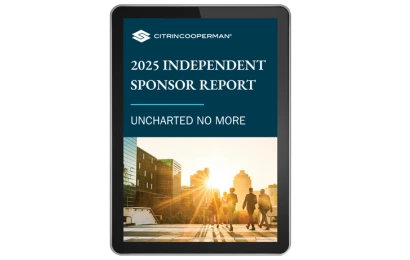Navigating Deals with Staged Due Diligence: Insights for Independent Sponsors
By David Zawitkowski, Michael Kornman, and Grant KornmanIndependent sponsors face a unique challenge in today’s deal environment: they must evaluate opportunities quickly and cost-effectively, often without committed capital or institutional infrastructure. Staged due diligence — a phased approach to evaluating deals — has emerged as a powerful tool to manage risk, preserve resources, and build credibility with capital partners.
“What we've learned after investing with many independent sponsors is that the ones who succeed long-term are methodical about risk management. Staged due diligence isn't just about preserving capital — it's about demonstrating to investors that they can make disciplined decisions under pressure and have a thoughtful approach to risk mitigation.” —Michael Kornman, Partner, Align Collaborate
Why Staged Due Diligence Matters
Staged diligence allows sponsors to align their efforts with the evolving certainty of a transaction. Rather than committing full resources upfront, sponsors can prioritize key risks early, validate assumptions, and deepen diligence as confidence grows. This approach not only safeguards limited resources but also strengthens trust and collaboration, ensuring that capital providers remain confident and engaged throughout the deal process.
“In today's market, we are not just evaluating the deal, we are evaluating the sponsor's process. When we see a sponsor using staged due diligence effectively addressing the key risks in a methodical way, it tells us they understand resource allocation, and they're thinking strategically about building a sustainable business rather than just chasing the next transaction.” —Grant Kornman, Partner, Align Collaborate
Rethinking the Traditional Approach
Independent sponsors typically operate without the large, dedicated deal teams or deep pockets of traditional private equity firms. They often raise capital deal-by-deal and must carefully manage time, resources, and risk exposure. Conventional due diligence models demand substantial upfront investment well before independent sponsors can confirm financing alignment or assess the target’s resilience. For independent sponsors operating without committed capital and with lean teams, this approach exposes them to significant financial strain and reputational risk.
For independent sponsors, staged due diligence is a pragmatic way to balance limited resources against the need for thorough risk assessment.
What Is Staged Due Diligence?
Staged due diligence is a phased, deliberate approach to evaluating a potential investment or acquisition. Instead of doing an exhaustive review all at once, the process is broken into sequential steps or stages. This allows investors, like independent sponsors, to progressively assess risks and opportunities, increasing their commitment as confidence grows.
- Initial Risk Scan: A high-level review of financials, market, legal, and operational risks to identify potential deal-breakers and validate the investment thesis.
- Targeted Deep Dives: In-depth analysis focused on priority areas such as detailed financial audits, legal contracts, tax issues, customer contracts, and operational processes, conducted once initial risks are cleared.
- Comprehensive Validation: Full-scope diligence and post-close planning once capital alignment and deal viability are confirmed.
This phased approach balances the need for speed with disciplined rigor, preserving critical resources while reinforcing confidence among capital partners in the sponsor’s measured and strategic execution.
A Proven Model for Sponsor Success
-
Preserve Scarce Resources
Independent sponsors operate without the cushion of a dedicated fund, managing lean teams while often putting personal capital on the line. Staged due diligence empowers them to focus on the highest-impact risks first, avoiding costly advisor fees and operating partner expenses on opportunities that may never materialize. This disciplined allocation of limited resources is critical to sustaining deal flow and long-term viability. -
Build Credibility with Sellers and Capital Providers
Sellers seek certainty and forward momentum, while capital providers expect thoroughness and discipline. A phased diligence approach establishes transparent checkpoints, enabling sponsors to validate key assumptions early and progressively deepen partner engagement as confidence grows. This method positions the sponsor as a prudent and reliable deal leader, strengthening trust across all stakeholders. -
Reduce Broken-Deal Exposure
Failed deals often leave independent sponsors shouldering sunk costs alone, which can strain finances and reputations. Staged diligence minimizes this risk by allowing sponsors to pull back early when red flags emerge. Paired with broken-deal fee arrangements — where capital partners agree to share certain costs if a transaction falls through — this approach provides crucial financial protection and fosters stronger alignment with investors.
“The independent sponsors we invest with who use staged approaches consistently deliver better outcomes, not just financially, but in terms of deal quality and execution speed. They're making smarter bets, moving faster on the right opportunities, and building stronger relationships with management teams. It's a win across the board.” —Michael Kornman, Partner, Align Collaborate
Making It Work: Best Practices
Successfully implementing staged due diligence requires thoughtful planning, clear communication, and strong partnerships. Independent sponsors can maximize the benefits by following these best practices:
- Set Clear Stage Objectives: Before launching each phase, define precise goals and decision points. What specific questions must be answered before advancing? For example, the initial risk scan might focus on validating core financial metrics and uncovering any regulatory red flags. Later phases could delve into operational efficiencies or customer contracts. Having clear objectives helps prevent scope creep, ensures focused effort, and provides measurable criteria for go/no-go decisions.
- Communicate with Capital Providers Early and Often: Bringing capital providers into the process from the outset fosters transparency and trust. Share the staged diligence plan, expected timelines, and key milestones. Regular updates at agreed checkpoints enable partners to provide timely input, adjust their level of commitment, and feel more confident in the process. Early involvement also helps prevent surprises that could derail alignment later.
- Engage Advisors Who Understand the Staged Model: Choose legal, financial, and operational advisors who are not only experts in their fields but also comfortable working within a flexible, phased diligence framework. These professionals should be able to tailor their scope quickly based on initial findings, helping you scale up or narrow down investigations without losing momentum. Their ability to pivot reduces wasted time and cost, keeping the process nimble and targeted.
- Negotiate Broken-Deal Protections Upfront: Deals don’t always close, and the financial impact can be particularly acute for independent sponsors investing personal capital and time. Mitigate this risk by negotiating broken-deal fee arrangements with capital providers, where certain diligence costs are shared if the transaction falls through due to reasons beyond your control. These protections help safeguard your balance sheet and encourage ongoing collaboration from investors, creating a more sustainable and equitable deal environment.
Positioning for Long-Term Success
For independent sponsors, staged due diligence transcends mere cost management — it represents a vital strategic differentiator in an increasingly competitive and complex deal landscape.
“As Michael and Grant’s perspectives highlight, sponsors who embrace this approach are better positioned to succeed — not just in closing deals, but in building enduring partnerships and sustainable businesses.” –David Zawitkowski, Partner, Citrin Cooperman Advisors LLC
By aligning diligence efforts with growing deal confidence, sponsors can accelerate decisions without compromising rigor, maintain credibility with sellers and investors, and focus limited resources on the most critical risks and opportunities.
As competition for quality assets intensifies and capital providers demand greater transparency, sponsors who adopt a phased, disciplined approach are better equipped to win deals, execute decisively, and create lasting value while mitigating risk at every stage of the transaction lifecycle.
If you’re ready to implement staged due diligence or refine your current approach, our advisors are here to help. Connect with David Zawitkowski, Michale Kornman, or Grant Kornman to explore how a phased diligence model can strengthen your deal execution, enhance investor confidence, and position your firm for long-term success.

Access the Report
Explore our 2025 Independent Sponsor Survey Report for more insights.
Latest Article Cards

The Present and Future State of Asset Management: Capital Raising
Read More
.webp)
SBA Increases Scrutiny of the 8(a) Business Development Program: What Government Contractors Need to Know
Read More

The Rise of the Real Estate Debt Fund
Read More

2026 Long Island Economic Survey
Read More

